In today’s digitally driven world, the role of data storage cannot be overstated. How we store and access data, whether for work, academics, or personal use, profoundly influences our efficiency and productivity. This comprehensive guide is designed to help you navigate the complex landscape of portable storage solutions. Specifically focusing on USB drive vs external hard drive. Examining key factors such as storage capacity, speed, portability, durability, and price, we aim to equip you with the knowledge. To choose the option that best aligns with your storage requirements.
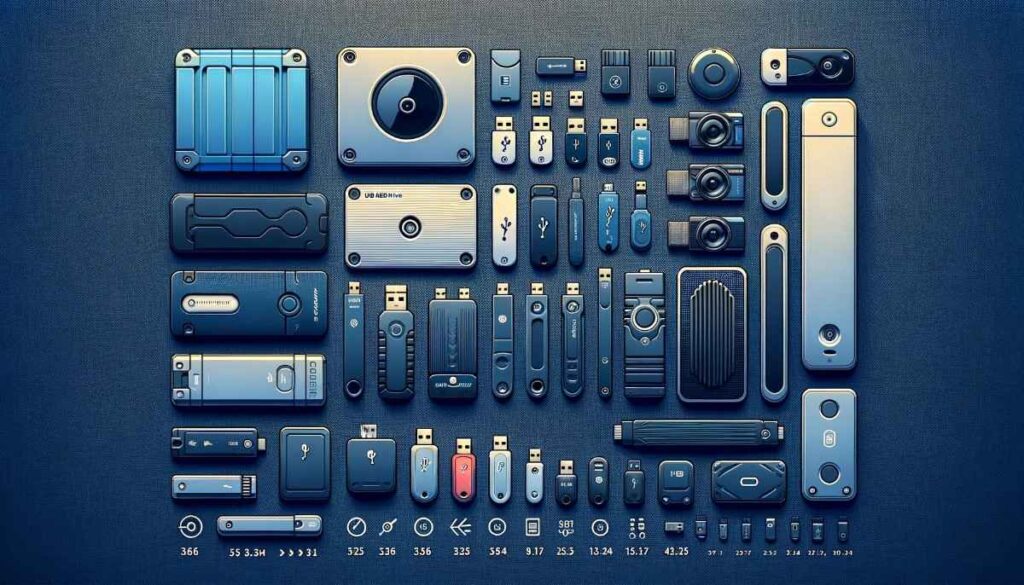
Deep Dive into Storage Solutions: USB vs External Hard Drive
In-Depth Analysis of Storage Capacity:
USB Drives: Initially introduced with modest storage capacities, USB drives have undergone significant evolution to advancements in flash memory technology. These devices offer storage options from a few gigabytes to an impressive 1TB, catering to various user needs. This evolution reflects the increasing demand for compact, portable storage solutions that can handle an array of data needs.
However, it’s important to note that USB drives are typically favored for their convenience and portability rather than their storage capacity. They are especially ideal for transporting documents, photos, and small media files, making them a practical choice for mobile users. Unlike external hard drives, USB drives are not designed to serve as the primary storage solution for large volumes of data.
When comparing USB vs external hard drives, one must consider the nature of the data being stored. USB drives offer quick access and are highly convenient for files that are frequently shared or need to be accessed on multiple devices. This makes them perfect for professionals who travel or students who need to exchange course materials.
On the other hand, for those dealing with larger data sets or in need of secure, long-term storage, external hard drives are more appropriate. These devices provide higher capacities and faster transfer speeds, essential for handling large video files, extensive photo libraries, and extensive data backups.
In summary, while USB drives excel in mobility and ease of use, their limited storage capacity may not fully meet the needs of users with substantial storage requirements. By understanding the specific advantages of each—USB drives for portability and external hard drives for capacity—you can choose the solution that best aligns with your storage needs and usage habits. This thoughtful consideration ensures that your selection not only enhances your digital interactions but also optimally supports your data management strategy in the USB vs External Hard Drive debate.
External Hard Drives: External hard drives stand on the opposite end of the spectrum compared to USB drives, serving as the behemoths of data storage. They offer capacities that significantly dwarf those of USB drives, with options available from 500GB to an immense 20TB. Engineered to meet the needs of users requiring vast storage spaces, external hard drives are an essential tool for data-intensive tasks.
For professional video editors who handle high-definition and 4K footage, external hard drives provide a reliable and spacious solution. These devices are also ideal for gamers looking to expand their console storage, allowing them to store more games and media effortlessly. Furthermore, individuals needing to secure large volumes of personal data find external hard drives indispensable for effective backups.
When considering USB vs external hard drive, it becomes clear that external hard drives are tailored for those who need robust, high-capacity storage solutions. Their ability to handle extensive data sets makes them perfect for professionals and individuals with significant digital storage needs. Whether it’s for professional use, gaming, or comprehensive data backups, external hard drives offer the durability and capacity required for heavy-duty storage.
In the debate of USB vs external hard drive, understanding the specific capacities and capabilities of external hard drives is crucial. They not only provide more space but also ensure faster data transfer speeds, which is vital for managing large files efficiently. This makes external hard drives a superior choice for those whose storage demands exceed the limitations of USB drives, ensuring data is not only stored securely but is also accessible when needed.
Speed: The Crucial Element of Data Transfer between USB vs External Hard Drive
For many users, the transfer speed between USB drive vs external hard drive is a critical factor. This section explores how USB drives and external hard drives stack up in terms of performance.
USB Drives: The introduction of USB 3.0 and USB 3.1/USB-C standards marked a substantial leap forward in USB drive performance. Compared to the older USB 2.0, these standards provide significantly faster data transfer rates, reducing the time for moving files.
Yet, a USB drive’s speed can vary widely based on the flash memory technology and controller it employs. Equipped with top-notch components, advanced models can match external hard drive speeds, albeit at a higher price point.
External Hard Drives: SSD-equipped external hard drives excel in speed, placing them in a league of their own for performance. These drives leverage the latest in data transfer interfaces, such as USB-C and Thunderbolt, to offer unparalleled performance.
Suited for data-intensive tasks like video editing, gaming, and software development, SSD-equipped external hard drives excel in rapid data access. SSD-based external hard drives enhance efficiency, reduce downtime, making them attractive for professionals and power users.
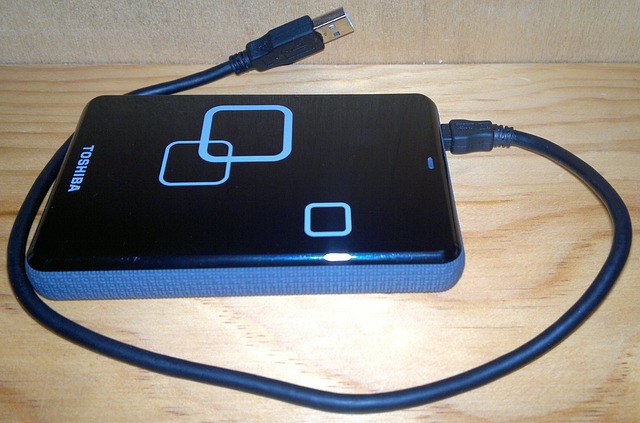
Portability: Keeping Data Mobile into USB vs External Hard Drive
In a world where mobility and convenience are highly valued, the portability of storage devices plays a crucial role in their appeal.
USB Drives: Compact and Convenient
USB drives represent the epitome of portable storage, designed to be as compact and lightweight as possible. Their small form factor allows users to easily carry them in a pocket or attach them to a keychain. This portability makes USB drives the ideal choice for users who frequently need to transport data between locations.
Despite their diminutive size, USB drives can store a significant amount of data, offering options for sharing documents, photos, and various files. In the context of USB vs external hard drive, USB drives excel in scenarios where ease of transport and quick data access are paramount. They serve as a convenient solution for students, professionals, and anyone needing to transfer small to moderate amounts of data quickly.
Moreover, when comparing USB vs external hard drives, it’s clear that USB drives are tailored for simplicity and immediate file access. This makes them particularly useful for presentations, quick file transfers at meetings, or for carrying everyday documents. Their plug-and-play nature enhances their usability, providing a straightforward and efficient way to manage and share data on the go.
In summary, while external hard drives offer larger storage capacities, USB drives win in terms of mobility and ease of use. Understanding the strengths of each storage type allows users to make informed decisions based on their specific needs, ensuring that their choice of storage solution, whether USB or external hard drive, aligns perfectly with their lifestyle and data management requirements.
External Hard Drives: Balancing Capacity with Portability
Modern external hard drives have evolved to become more compact and lightweight, enhancing their portability without sacrificing storage capacity. This evolution allows them to offer a balance between high storage capacity and ease of transportation, making them suitable for moving large volumes of data between locations. In the context of USB vs external hard drive, external hard drives stand out by providing substantial storage space that USB drives cannot match.
External hard drives serve as a versatile storage solution, ideal for various applications including backing up important files, transporting extensive media collections, or extending the storage capacities of laptops and gaming consoles. When comparing USB vs external hard drive, it’s evident that external hard drives offer the robustness required for more demanding storage tasks.
Moreover, external hard drives are particularly beneficial for professionals in fields such as photography, videography, and information technology, who require reliable and expansive storage solutions. Their ability to store and transfer large files efficiently makes them indispensable in scenarios where data integrity and security are paramount.
In summary, while USB drives provide convenience and portability for smaller data tasks, external hard drives deliver the performance and capacity needed for larger data challenges. Understanding the distinct advantages of each can help users make informed decisions, ensuring they select the right storage option—USB vs external hard drive—to suit their specific needs and workflows.
Durability and Reliability: Safeguarding Your Data into USB vs External Hard Drive
Durability and reliability of a storage device are critical considerations for users who rely on their data for various reasons.
USB Drives: Thanks to their solid-state design, USB drives are inherently resistant to physical shock, vibrations, and drops. This makes them a durable option for carrying data on the go. However , their compact size also makes them easy to misplace or lose, posing a risk to data security. Advances in encryption and password protection have mitigated these risks, making USB drives a secure option for transporting sensitive information.
External Hard Drives: The durability of an external hard drive depends largely on its technology. Traditional HDD-based drives contain moving parts, making them more susceptible to damage from physical shocks. On the other hand, SSD-based external drives, devoid of moving parts, offer increased durability and shock resistance. While SSDs come at a higher cost, their longevity, reliability can be a worthwhile investment for users prioritize data integrity.
Price: Evaluating Cost-Effectiveness into USB vs External Hard Drive
The cost of storage solutions is a crucial factor for many users, influencing the decision between USB drive vs external hard drive.
USB Drives vs External Hard Drives: Assessing Portability and Cost Efficiency
Provide a cost-effective solution for those with moderate storage requirements, making them widely accessible to a diverse audience. While the price of these devices increases with storage capacity, they still remain an affordable option for users who value a balance between portability and storage capacity. In the debate of USB vs External Hard Drive, USB drives attract users who need a compact, easy-to-carry storage option without a significant financial outlay.
Comparatively, when examining USB vs External Hard Drive, it’s clear that USB drives are more suited for everyday data transfer and small-scale backups. This makes them particularly appealing to students, casual users, and professionals who require quick access to their files on multiple devices. Although external hard drives offer larger storage capacities, the lightweight and minimal cost of USB drives offer a practical alternative for less demanding storage tasks.
Ultimately, in the USB vs External Hard Drive comparison, choosing between the two depends on specific storage needs and budget constraints. USB drives serve well for those needing immediate and portable access to their data, while external hard drives are better for extensive storage requirements.
Cost Efficiency of External Hard Drives: Maximizing Storage Value
When evaluating storage options in terms of value, external hard drives are the clear frontrunners, particularly when considering the cost per gigabyte. Although these devices demand a higher initial investment compared to USB drives, the overall expense per unit of storage is significantly lower. This economic advantage makes external hard drives a compelling choice for users who require substantial storage capacity for backups, extensive media collections, or large datasets.
In the USB vs External Hard Drive comparison, external hard drives prove advantageous for those needing to store high volumes of data cost-effectively. This is particularly true for professionals in fields like videography, digital arts, and data science, where large file sizes are common. Additionally, external hard drives offer better long-term storage solutions, making them ideal for archival purposes or extensive project files.
Ultimately, in weighing USB vs External Hard Drive options, external hard drives offer the best value for anyone requiring significant storage capabilities. Their lower cost per gigabyte, coupled with higher storage capacities, provides an economical solution for managing large amounts of data efficiently.
Use Case Scenarios between USB vs External Hard Drive:
Tailoring Storage to Fit Your Needs Choosing the right storage solution depends heavily on how you intend to use it. This section explores various scenarios to help you determine which option best fits your needs.
USB Drives: Streamlining Everyday Data Management
USB drives are perfectly tailored for daily tasks such as sharing documents, transporting presentations, or carrying photos and videos between devices. They are highly favored among students, office workers, and anyone who appreciates the convenience of readily accessible, moderate storage capacity. Whether it’s for swift data transfers, temporary storage needs, or emergency backups, USB drives present a versatile and user-friendly option.
In the comparison of USB vs External Hard Drive, USB drives are particularly advantageous for those who prioritize portability and ease of use. Their small size and plug-and-play functionality make them ideal for quick access to data across multiple devices. Moreover, USB drives are an excellent choice for people on the move who need to manage and transfer files without the need for bulky equipment.
Ultimately, in the ongoing USB vs External Hard Drive debate, USB drives serve as a practical solution for less demanding storage tasks, providing sufficient space for everyday digital activities without a hefty price tag. For those weighing their options, USB drives offer a convenient, cost-effective way to meet moderate storage demands efficiently.
External Hard Drives: Enhancing Capacity for Demanding Applications
For users with demanding storage needs, external hard drives deliver the necessary capacity and performance to handle large volumes of data. Professionals in fields such as photography, video production, and software development find external hard drives indispensable for their extensive storage capabilities and swift data access. These devices are crucial for managing large files and supporting complex projects, making them a vital resource in these industries.
Moreover, external hard in the USB vs External Hard Drive comparison, external hard drives are also ideal for gamers who wish to expand their console storage, as well as for individuals aiming to enhance the storage capabilities of their personal computers. The superior storage capacity and faster data transfer rates make external hard drives a preferable choice for intensive data storage tasks.
In summary, external hard drives stand out in the USB vs External Hard Drive debate as the go-to solution for high-demand storage requirements. Whether it’s for professional multimedia projects, gaming enhancements, or substantial data backups, external hard drives offer the robust performance and capacity needed for extensive digital activities.
USB vs External Hard Drive: Choosing the Right Storage Solution

Deciding between a USB vs external hard drive requires evaluating your specific storage needs, budget, and how you plan to use the device. If convenience and smaller-scale data transfers are your priorities, USB drives provide an exceptional blend of portability and simplicity. These compact devices are perfect for quick and easy access to your files, especially on the go. On the other hand, for those who require large amounts of storage for data-intensive tasks, external hard drives are more suitable. These units offer the substantial capacity and enhanced speed needed for efficient large-scale data management.
When exploring the USB vs external hard drive debate, it’s important to consider how each option fits into your digital routine. USB drives, with their small size and absence of power cables, are ideal for users who need data mobility without hassle. Conversely, external hard drives, with their higher storage capacities and faster data transfer rates, are better suited for extensive multimedia projects or backups.
By carefully assessing the outlined factors in this guide, you can make a well-informed choice that complements your digital lifestyle. Whether you choose the sleek, minimalistic appeal of a USB drive or the robust, high-capacity functionality of an external hard drive, selecting the appropriate option ensures that your data is not only secure but also readily available whenever you need it. This decision will significantly impact your ability to manage and access your digital files effectively, enhancing your computing experience.
Incorporating visual aids can further enhance your understanding of the differences between these two storage options.
Here are three images that visually compare USB vs external hard drive, illustrating their size, design, and use case scenarios:
1. Visual Comparison of Size and Design: This image showcases a range of USB drive vs external hard drive, highlighting the compact nature of USB drives versus the larger, more robust design of external hard drives. The variety of shapes and colors of USB drives indicates their personal and casual use. The professional appearance of external hard drives suggests their suitability for extensive data storage and backup solutions.
2. Speed and Capacity Indicators: An image that includes visual cues such as speed icons or capacity labels can help viewers understand the significant differences in speed and storage capacity between USB drive vs external hard drive. The visual emphasizes USB drives’ portability, contrasting with external hard drives for superior storage capacity and faster data transfer rates.
3. Use Case Scenarios: A third image could depict various scenarios in which USB vs external hard drives are used, such as a student transferring lecture notes with a USB drive or a professional photographer backing up large photo libraries to an external hard drive. This visual representation helps users identify specific use cases and understand which storage solution aligns with their needs.
By considering visual comparisons and the detailed insights in this guide, you can confidently navigate the world of portable storage. Choose the option that best supports your data storage and access needs.
This comprehensive guide has now been expanded to provide a deeper understanding of the factors to consider when choosing between USB vs external hard drive. The guide emphasizes technological aspects, use case scenarios, and includes visual comparisons. It aims to equip you with knowledge. Make a well-informed decision aligning with your storage needs.
The Evolution of Storage Technologies between USB vs external hard drive:
Before delving into USB drive vs external hard drive specifics, it’s crucial to grasp technological advancements shaping the current state of portable storage. Understanding these developments is essential. Evolution from magnetic tape, floppy disks to sophisticated solid-state drives (SSDs) and large-capacity hard disk drives (HDDs) represents significant leap. Consequently, progression has resulted in faster, smaller, more reliable storage options, accommodating vast amounts of data in increasingly compact devices.
Comparative Analysis: USB vs External Hard Drive
Connectivity and Compatibility:
- USB Drives: Utilize universal serial bus (USB) technology, ensuring they are compatible with a wide range of devices, from computers and laptops to TVs and car audio systems. USB drives, characterized by their plug-and-play nature, empower users to seamlessly utilize them across various operating systems. The attainment of this versatile functionality is accomplished by users without the need for drivers or installation software. Ensuring seamless integration and operation, USB drives cater to individuals navigating diverse platforms. They commit to a user-friendly experience across various operating systems.
- External Hard Drives: Also connect via USB but may use other interfaces such as Thunderbolt for higher transfer speeds. While universally compatible with PCs and Macs, ensuring the right connection (USB-C, USB 3.0, Thunderbolt, etc.) is available on your device is crucial for maximizing performance.

In-Depth Sections:
Security Features
Discussing the importance of data security, this section compares the encryption options available for USB vs external hard drive. Moreover, it emphasizes manufacturers integrating hardware encryption in some models, adding an extra layer of security for users’ sensitive information.
Longevity and Maintenance
In the debate of USB vs External Hard Drive, understanding the lifespan of each storage option is crucial. USB drives generally offer fewer write cycles compared to external hard drives. However, external hard drives are susceptible to mechanical wear due to their moving parts. Properly maintaining your storage devices can greatly enhance their longevity and reliability. Regular maintenance practices for both USB and external hard drives include keeping them clean and dust-free.
Furthermore, it is essential to employ regular backups to safeguard your data against potential drive failures. Additionally, using high-quality cables and connectors is vital for maintaining optimal performance over time. This section highlights the differences in durability and upkeep between USB vs external hard drives, emphasizing the need for thoughtful maintenance.
Environmental Impact
This exploration delves into the environmental considerations associated with the production, use, disposal of USB vs external hard drive. Additionally, it includes tips for eco-friendly practices and recycling options, aiming to minimize your storage choices’ ecological footprint. Understanding the environmental impact of these devices, users make decisions that align with sustainable practices, contributing to more eco-conscious approach. This guide empowers users with knowledge to make environmentally responsible storage choices, fostering a greener and more sustainable digital landscape.
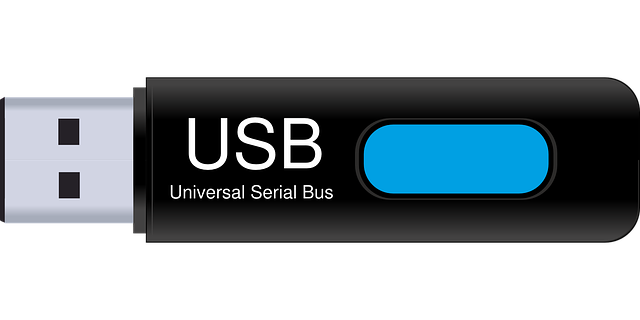
FAQs: Navigating Your Storage Options between USB vs external hard drive
Q1: Can I use a USB drive as a permanent storage solution?
Although USB drives can technically be used for long-term storage, they are best for transferring or temporarily holding data. This is due to their limited storage capacity and durability compared to external hard drives.
Q2: How do I choose between an HDD and SSD external hard drive?
Your choice should be based on your specific needs: HDDs offer more storage space for a lower price but are slower and more fragile due to moving parts. SSDs are faster, more durable, and consume less power, but come at a higher cost per gigabyte.
Q3: Is it worth investing in a high-speed USB drive?
If you frequently transfer large files or require quick access to your data, investing in a high-speed USB drive (USB 3.0 or later) is worthwhile. For basic file transfers or small documents, a standard speed USB drive may suffice.
Q4: How can I protect my data on a portable storage device?
Using encryption and password protection are effective ways to secure your data. Additionally, consider backing up important files in multiple locations, such as cloud storage or another external hard drive, to protect against loss or damage.
Q5: Can I use both a USB drive and an external hard drive together?
Absolutely! Using both devices can maximize your storage flexibility. For example, you might use a USB drive for daily tasks and transporting files, while an external hard drive can serve as a backup solution or for storing large media collections.
Making the Right Choice USB drive vs external hard drive:
The decision between USB vs external hard drive boils to your specific storage needs budget, plan to use the device. By considering the factors outlined in this expanded guide, including technological advancements, security features, longevity, and environmental impact, along with the FAQs, you are well-equipped to make an informed choice that aligns with your digital lifestyle.
Remember, the ideal storage solution is one that not only meets your current needs but also accommodates future requirements as your data storage needs evolve. Whether you opt for the convenience and portability of a USB drive or the robust capacity and speed of an external hard drive. It will ensure your data is secure, accessible, and efficiently managed is the result of making an informed choice.
This comprehensive guide aims to cover all aspects of choosing between USB vs external hard drive. It provides a deep understanding of each option’s benefits and limitations. Armed with this knowledge, you’re ready to select the storage solution that best supports your data storage and access needs.
Ensure your digital files are always safe and within reach.







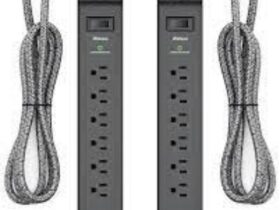


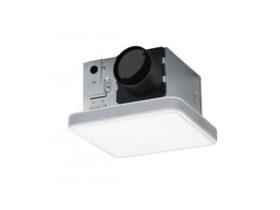
Leave a Review